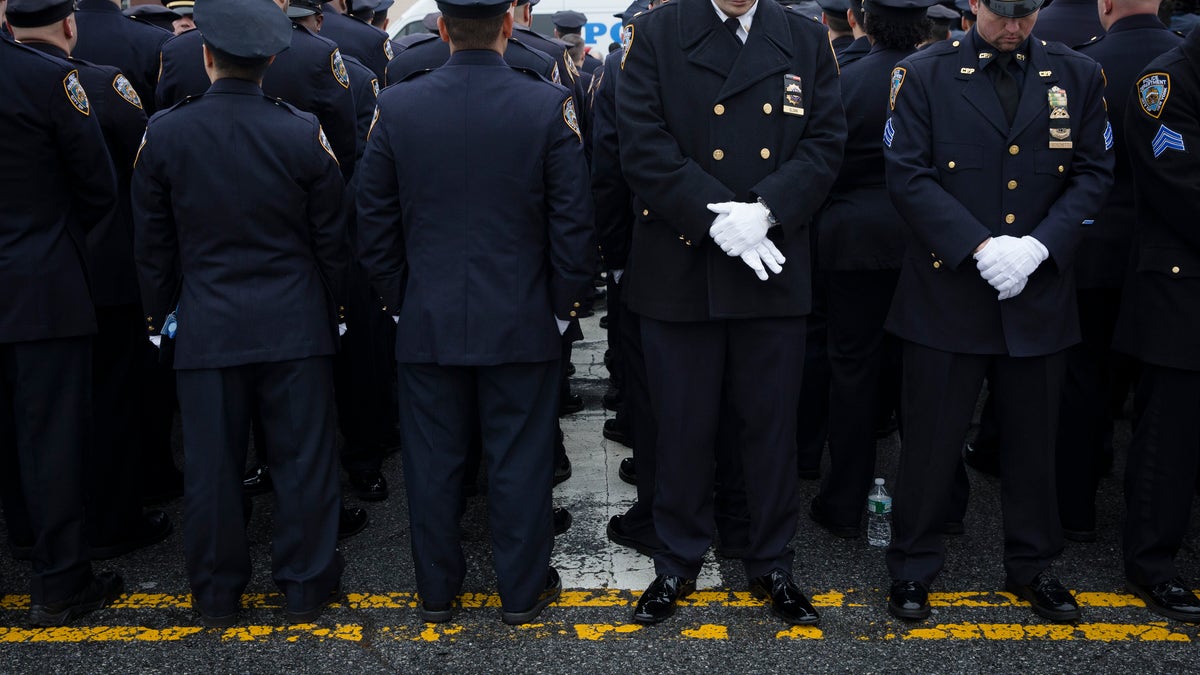
Police officers, left, turn their backs to Mayor de Blasio during the funeral of NYPD Officer Wenjian Liu, Jan. 4, 2015.
Public servants take an oath to protect and uphold the Constitution and laws. From that solemn oath stems a police officer’s duty to serve and protect the public. The Constitution is merely a reflection of the will of the people.
The rule of law also flows out of the Constitution: the democratic order, our public institutions, statutes and regulations, policing itself. Law and order exist because as society we have deemed vital to grant a shield, a weapon, and a salary to the men and women tasked with keeping it.
If police turning their backs on an elected leader—on the people—doesn’t get us to rethink the kind of men and women we want defending everything we hold dear, then nothing will.
That’s why New York and the country shook when a deranged gunman shot and killed police officers Rafael Ramos and Wenjian Liu. When you threaten the life of a police officer, you threaten the rule of law itself. Everyone feels unprotected.
But we also feel unprotected when police turn their backs. That’s precisely what happened when scores of people in uniform—ostensibly in mourning over Ramos and Liu’s senseless deaths—turned their backs on Mayor Bill de Blasio during the officers’ funerals.
For a police officer, turning his back on the mayor is not a protest. A real protest is a legitimate part of the social contract, enshrined in the First Amendment right of free speech. Nothing stops an officer from freely expressing himself or criticizing political leaders when off duty, or in private with colleagues and family members.
But when a police officer—in uniform, armed, and bearing a shield that represents us all—stages an act of defiance in public and in front of an official elected by the public, there’s nothing legitimate or democratic about his actions. It’s insubordination. It’s a violation of their oath to protect and uphold the Constitution and laws.
Suppose for a moment that another lunatic with a gun, the kind that kills public officials, would’ve interrupted the ceremonies. Would any of the back-turning officers have bothered to make the ultimate sacrifice and protect the mayor? Would they even have noticed? Anyone worthy to bear the shield of the state stands at attention in time of crisis, not turn his back.
Which is why this spectacle should not be read through the lens of politics or opportunism; it is instead a constitutional problem. What happened in New York should be a cautionary tale for the United States. Is this the kind of force the country wants enforcing its laws, its ideals, its institutions?
The irony of this episode is that it finds its roots in another constitutional issue: the discriminatory application of stop-and-frisk tactics on New Yorkers of color. Last year, a federal court in Manhattan declared the NYPD’s application of such tactics unconstitutional. But police unions attempted to appeal the ruling, arguing in court that compliance with it dealt a blow to police morale and its bargaining rights with the city. A panel of federal appellate judges roundly ismissed those concerns.
It’s a troubling precedent nonetheless—the notion that police reputation and self-interest somehow trumps compliance with the Constitution. That it trumps the will of the people. The same people who put Bill de Blasio in power. The same people who grew weary of stop-and-frisk and simply asked for fairer treatment from those who took an oath to serve and protect them.
If police turning their backs on an elected leader—on the people—doesn’t get us to rethink the kind of men and women we want defending everything we hold dear, then nothing will.
